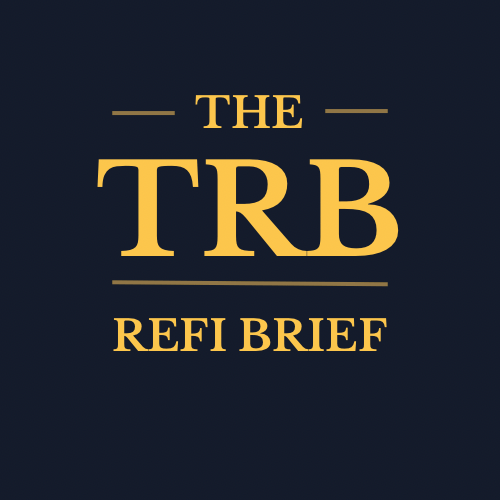
GM. It’s The ReFi Brief on a Saturday. Tokenized real estate news explained in simple terms, so anyone can understand and explore how digital property works and why it matters.
In this week’s ReFi Brief:
Chainlink Partners with Balcony to Tokenize Over $240 Billion in Global Real Estate Assets.
Securitize Set to Go Public at $1.25 Billion Valuation Via SPAC Merger.
T-RIZE Group Launches First Tokenized New-Construction Real Estate Equity Deal on Canton Network.
Standard Chartered Forecasts $2 Trillion in Tokenized Assets by 2028, With Real Estate Leading on Ethereum.
Genesis & Metrospaces Merge to Launch Tokenized Property Platforms.
This week signaled blockchain's transformative power in property investment with major players driving mainstream digital asset adoption. Verified data, public listings, new equity models, and trillion-dollar forecasts are lining up. Real estate is setting the stage to be tokenizations biggest story in 2026 and beyond.
THE BIG READ
$240B in Verified Property Records Go On-Chain. Can “Proof of Property” finally match Proof of Payment?
Yesterday marked 17 years since Satoshi Nakamoto published the Bitcoin whitepaper, a design for money that could move peer-to-peer without banks.
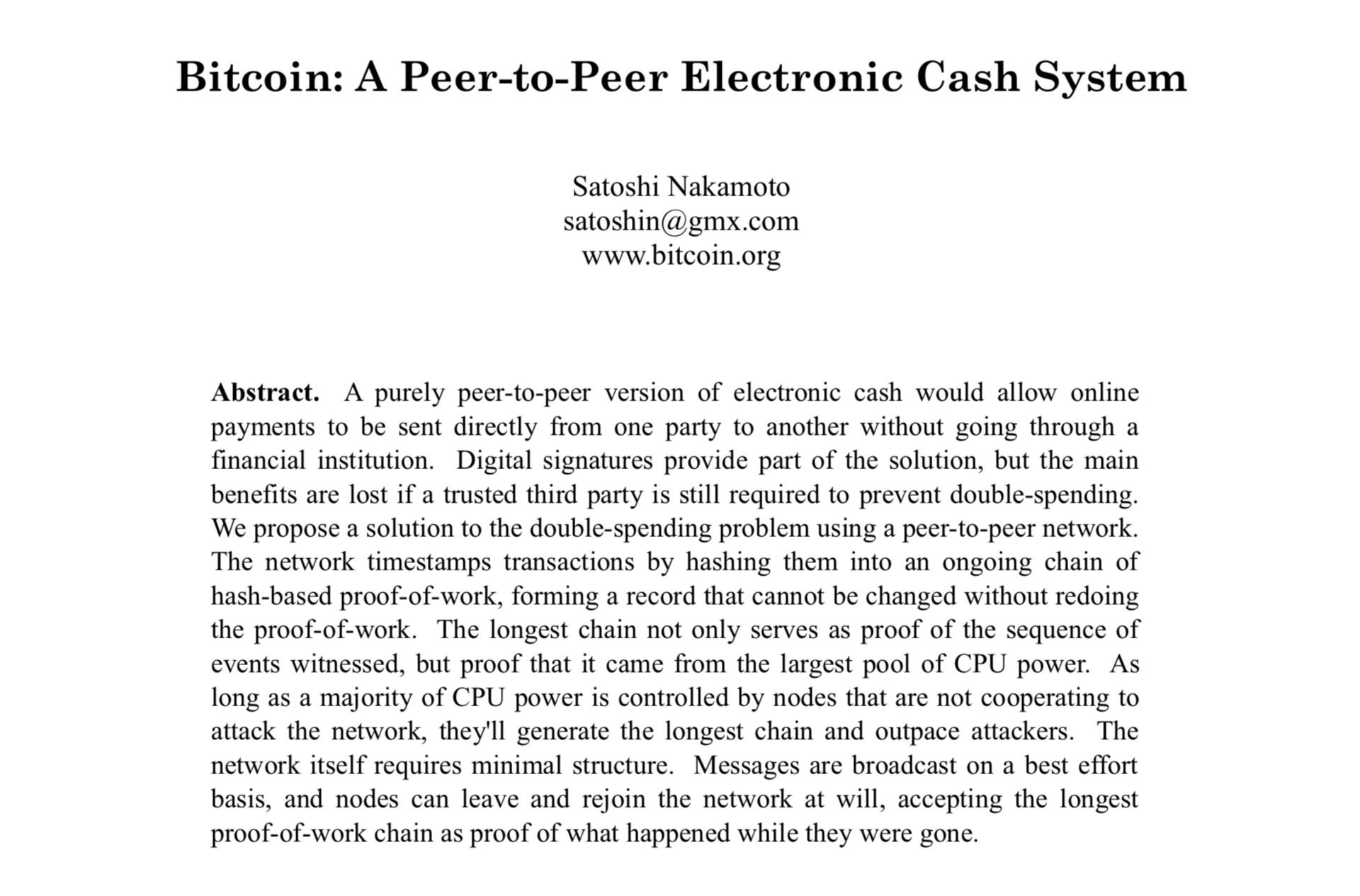
It wasn’t really about coins; it was about proof. Ownership recorded publicly, executed automatically, and immune to tampering.
Seventeen years later, that same idea is reappearing in real estate titles.
This week, Chainlink and Balcony revealed a system that could let verified property ownership live on a blockchain.
Is this the clearest attempt yet to make “proof of property” as transparent as proof of payment? I think it is.
What happened?
Balcony and Chainlink entered a partnership that brings $240 billion worth of property assets into scope for on-chain verification
Balcony, the leading platform for government-sourced real estate tokenization, is integrating Chainlink’s oracle network so title data can be verified, updated, and audited in real time.
Now, bringing government data onchain is no small feat, and for the largest asset class in the world. This is BIG.
Pilots already underway in Bergen County, New Jersey show parcel-level syncing between public records and blockchain ledgers.
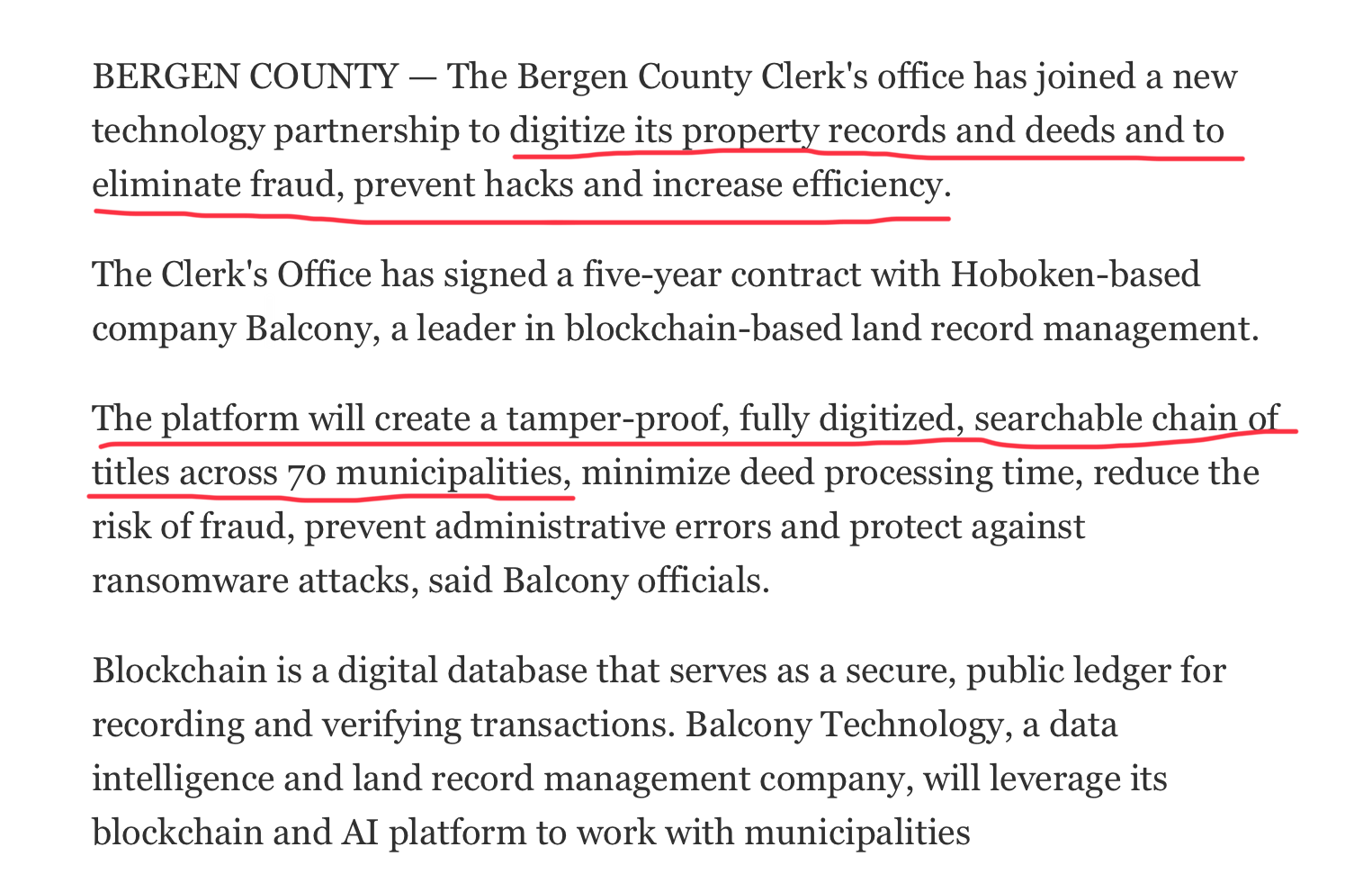
The stated aim: cut title-processing costs by up to 50 percent, reduce fraud, and prepare the ground for fractional ownership of verified property tokens.
Who is Chainlink, and why does this matter?
Chainlink isn’t an app, it’s infrastructure. It’s what’s called an oracle network, a bridge connecting the off-chain world (government databases, market feeds) to on-chain code.
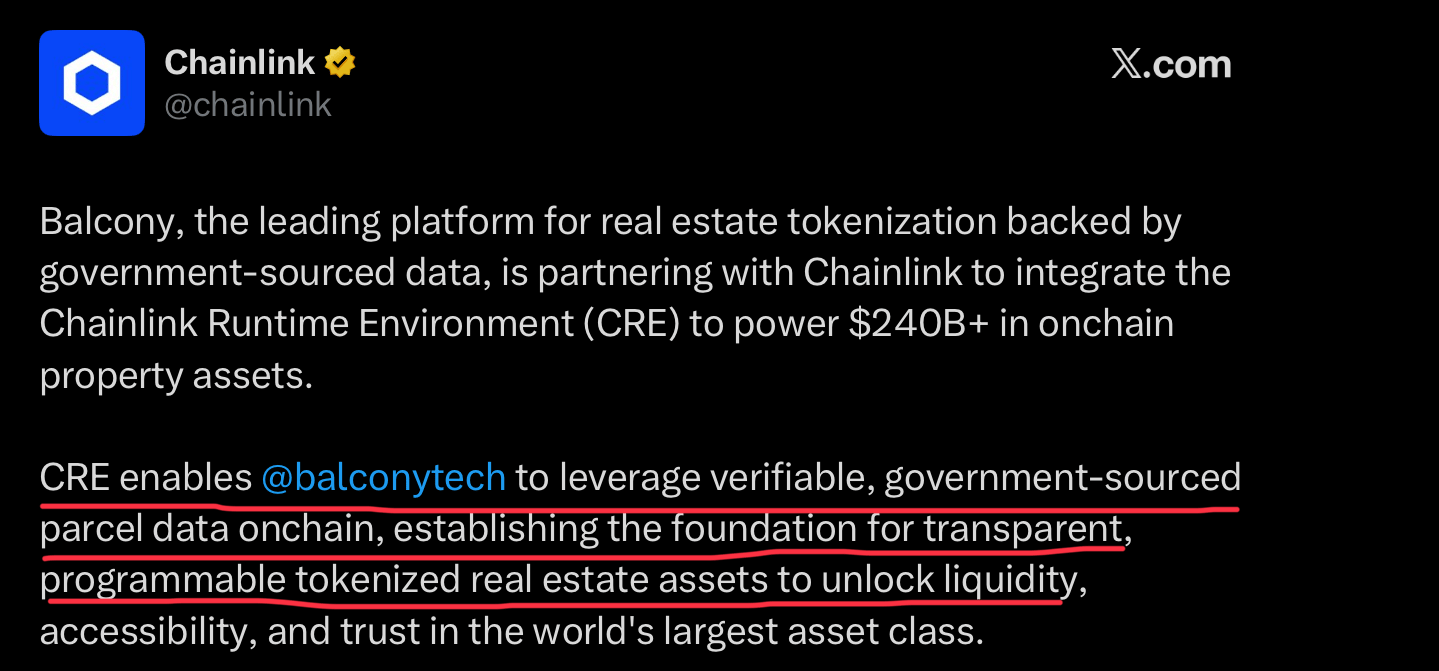
If a blockchain is the ledger, Chainlink is the court clerk bringing in verified documents so the record can be trusted.
Balcony manages the official records, Chainlink supplies the verified data feed that lets those records talk to blockchain finance.
In this case, those documents are land titles and parcel records.
Balcony’s integration of Chainlink’s runtime environment allows official land data to stream directly onchain. That means the blockchain isn’t storing speculation, it’s storing authenticated government property data.
The enforcement layer: smart contracts as digital escrow
Once Chainlink delivers the verified data, smart contracts handle the rest. A smart contract is digital escrow.
Once verified data hits it, the code executes the rule automatically. If title checks out and funds are in place, it records the transfer and settles payment without a human clerk.
That’s standard blockchain plumbing, not new in itself, but here the novelty is the authenticated government data feeding those contracts.
The contract enforces the same facts the land office already trusts, closing the loop between law and code.
Is this registry-level ownership or just exposure?
Most tokenized deals today give you units in an SPV, a special-purpose vehicle that owns the deed.
That’s real ownership of the wrapper, with enforceable payout rights, but the land registry still lists the SPV as owner. Balcony’s approach targets the harder goal: registry-level ownership.
Each onchain record mirrors the government title itself. If it works, your token doesn’t just sit inside an SPV; it matches the same entry the county clerk sees.
That difference matters. SPVs give investors rights to income and value. Registry integration gives them name-on-title recognition, a bridge between financial exposure and legal ownership.
What you’d actually hold in your digital wallet
Picture a building divided into digital slices.
Each slice represents a confirmed share of ownership and when you buy one, the blockchain pings the government database, verifies your claim, and writes it into an immutable ledger.
Verification is the transaction. No middle office. No waiting for paperwork. If the registry confirms it, you own it - visibly, verifiably, and trade-ready.
Why the gates are finally opening
Real estate has always been an insiders’ market. It demanded big capital, long timelines, and local access. Balcony’s model could lower that to a few hundred dollars per stake
Chainlink’s Colin Cunningham called it “a new standard for transparency and efficiency”

For governments, it reduces fraud and speeds up revenue collection. For smaller investors, it could mean verified, fractional property ownership across borders.
Why this moment feels real
For years, tokenization has sounded like theory in search of proof - the burden of proof was always on crypto startups. Now the receipts are streaming in from banks, institutions and governments.
On October 31, Standard Chartered projected that tokenized assets could reach $2 trillion by 2028, with real estate driving much of the growth.
That forecast came from a century-old bank known for caution, not hype. It stamped legitimacy on a market once dismissed as experimental.
In the same week Securitize, arguably the leading platform for tokenizing real-world assets including real estate, announced a business combination with Cantor Equity Partners II to become a public company listed on Nasdaq, valued at $1.25 billion pre-money. Investors include Blackrock and ARK Investors.
And the Chainlink–Balcony deal adds scale to that outlook. If $240 billion in property records can be verified through official registries, the bridge between institutional forecasts and working systems is no longer abstract, it’s measurable.
Takeaway
Bitcoin has shown that value can be kept and be moved without intermediaries. Now, real estate is learning to prove ownership in the same way.
What began as a whitepaper about money is becoming a blueprint for ownership of the biggest asset class on earth.
Each verified property token is an echo of that 2008 idea, value you can hold, transfer, and trust without permission.
This past week, at the Future Investment Initiative in Riyadh, Larry Fink put it bluntly:
“We’re not spending enough time talking about how quickly we’re going to tokenize every financial asset… Most countries are ill-prepared for how fast this will change the plumbing of finance.”
That plumbing is here.
Enjoy the weekend,
TM

Coffee Chat
What is Tokenized Real Estate?
Think of a big apartment building. Normally, one person or company would have to buy the whole thing. Tokenization changes that by splitting the ownership into hundreds or thousands of tiny digital slices, called tokens.
Each token represents a share in the property, and because it’s recorded on a blockchain, the ownership record is tamper-proof and easy to transfer.
Suddenly, something that used to take millions to get into can be opened up for a few hundred dollars. It’s a way of making real estate feel less like an exclusive club and more like buying stock in a company you believe in.
THE WEEK IN BRIEF

Image Source: @securitize on X
The Brief: Securitize, the BlackRock-backed tokenization platform, is going public through a Cantor Fitzgerald SPAC at a $1.25 B valuation. It plans to tokenize its own stock, a first that could put SEC-regulated equity directly on-chain.
The Details:
Securitize holds SEC licenses as a transfer agent, broker-dealer, and ATS. The full compliance stack.
Existing investors like ARK Invest and BlackRock are rolling 100% of their shares into the new public entity, signaling trust.
The firm has already issued $4B+ in tokenized funds and private equity, including BlackRock’s BUIDL product.
It will tokenize its own Nasdaq-listed shares to show that public stock can trade 24/7 on-chain.
The listing adds $225M in fresh capital to expand low-minimum, retail-friendly offerings.
What This Means: This is the clearest bridge yet between Wall Street oversight and blockchain rails. Compliance is no longer theory, it’s filing with the SEC. Access may follow, as tokenized funds with $100 tickets become easier to trust.
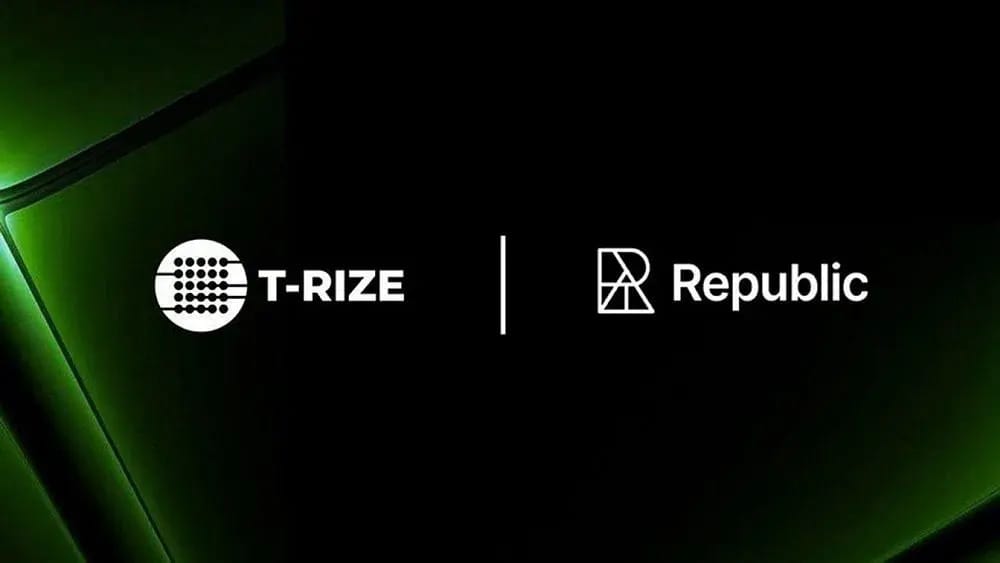
Image Source: ASN Newswire
The Brief: A live $24.2 M raise is underway on Republic for a 60-unit development near Montreal. It’s the first construction-stage real-estate deal on the Canton Network, targeting 12 % IRR with built-in secondary liquidity.
The Details:
Structured under Reg D and Reg S through Republic’s FINRA-licensed broker-dealer, ensuring investor eligibility.
Tokens represent equity in the project company, with a one-year lock then tradability on Republic’s ATS.
Third-party appraisal by CBRE and insurance bond by Intact add institutional-grade risk controls.
Modeled returns: ~6-9 % annual income once built, 12 % IRR over five years.
Built on Canton, the enterprise blockchain backed by Goldman Sachs and Moody’s, which enforces whitelisted trading.
What This Means: Liquidity in property development has never existed before. If these tokens trade post-lockup, it shows fractional builders can fund, hold, and exit projects without waiting five years for a sale, a major liquidity test.
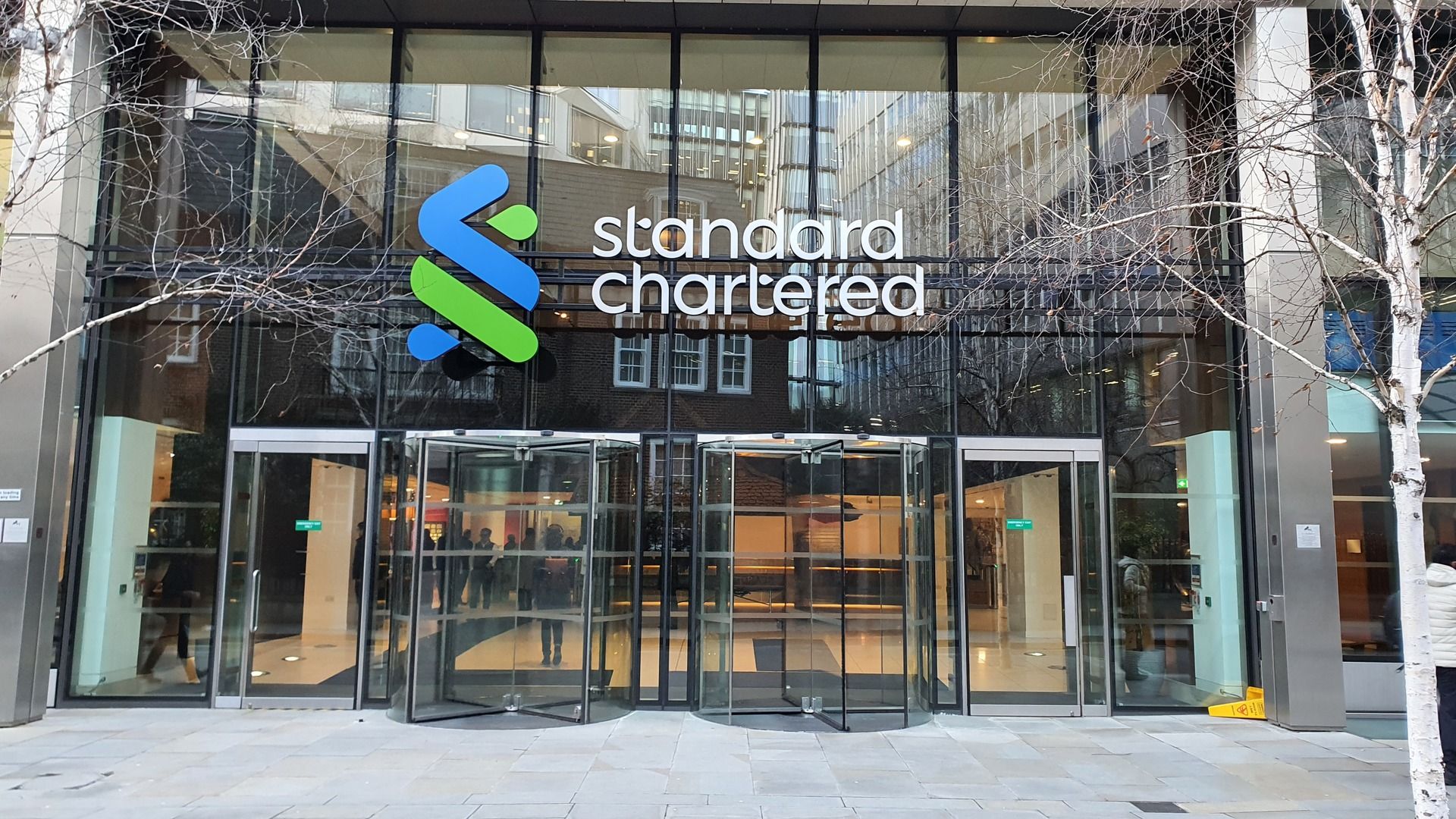
Image Source: Wikipedia
The Brief: In a new report, Standard Chartered projects non-stablecoin tokenized assets to hit $2 trillion within three years, with real estate a core $100–200 B slice. Ethereum is tipped to remain the main settlement layer.
The Details:
Forecast: $750B each in tokenized money-market funds and equities, $500B in private assets including property.
Bank analysts cite 5-7 % real-estate yields and potential 12-18% total returns when DeFi compounding is included
“Most RWA activity will stay on Ethereum,” says the report.
Base-case assumes U.S. regulatory clarity by 2026 and no major obstacles to growth.
The bank views tokenization as self-sustaining once liquidity and regulation align.
What This Means: ROI is the headline. Tokenized assets could match stock-market returns with steadier income. The forecast treats public blockchains as compliant infrastructure, not experiments, marking tokenization’s arrival in mainstream finance.

Image Source: Dallas Innovates
The Brief: Genesis Holdings has acquired Metrospaces’ tokenization tech and will launch two real-estate platforms this quarter. The aim: fractional access to boutique hotels and premium rentals, plus internal secondary trading.
The Details:
Metrospaces’ CEO Oscar Brito becomes Co-CEO of Genesis, keeping continuity of the tokenization vision.
MetroCrowd will host boutique-hotel offerings; MetroHouse targets short-term rental portfolios.
Offerings to be structured as regulated STOs under SEC exemptions or Reg A+ filings.
Some tokens may include a Bitcoin-treasury hedge - part property, part digital-hard-asset.
The merger consolidates PropTech, token issuance, and management under one public company.
What This Means: Access meets experimentation. If retail investors can own and trade slices of hotels with a few hundred dollars, liquidity starts to move from promise to practice, though execution will decide whether it scales beyond hype.
BRIEF X SIGNALS
🔗 Slovenia registers first tokenized parking space in EU land registry via notarized BSPT loan agreement. This breakthrough links onchain tokens directly to official property records, providing legal collateral and compliance safeguards for investors.
🔗 Brazil’s CVM forecasts tokenized asset market surpassing $740M near-term, potentially $1.8B with regulatory tweaks. Drawing from 2023 Virtual Assets Law and BCB oversight, this projection signals structured growth in regulated RWAs. For investors, it highlights emerging yield opportunities in compliant vehicles, lowering entry barriers while ensuring legal safety through policy-backed adoption.
🔗 $PRO launches on Aerodrome, migrating assets for emissions and staking rewards on Base network. By staking liquidity in top pools, Propy enables programmable onchain real estate transactions with faster settlements. Investors benefit from enhanced liquidity and access, allowing low-minimum participation in tokenized properties with automated yields distributed seamlessly.
🔗 @chainlink Partners with Balcony to tokenize $240B in government-sourced real estate data using Chainlink Runtime Environment. This integrates verifiable parcel-level metadata across 100+ countries, enabling secure fractional ownership and transparent records. For investors, it addresses compliance via audited data feeds, unlocking global access to property-backed tokens with reliable liquidity through onchain markets.
🔗 @propyinc Allocates $100M for U.S. title and escrow acquisitions to expand onchain real estate closings nationwide. Building on AI-driven efficiency and regulatory licensing, this roll-up strategy modernizes traditional processes with blockchain deeds. Investors to see improved access and compliance, as minimums drop for fractional investments with clear ROI from automated, verifiable yields and exits
^
See you in the next brief,
Tatenda

